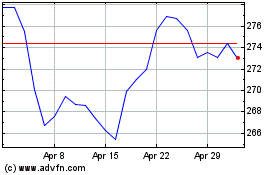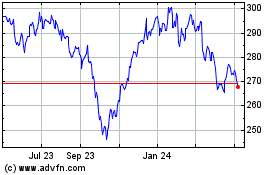McDonald’s Refranchising Plan in Asia Holds Financial Risks, SEIU Warns Investors
June 20 2016 - 11:36AM
Business Wire
Letter Shows Expanding Global Reach of
Union’s Campaign to Hold McDonald’s Accountable to Workers,
Taxpayers, Investors
As McDonald’s Corp. (NYSE:MCD) seeks buyers for more than 3,000
stores throughout Asia, the Service Employees International Union
sent a letter Monday to potential purchasers detailing financial
risks posed by the “master licensee” model at the core of the
company’s growth strategy across the continent.
SEIU reached out to hundreds of global firms who are potential
buyers and are active in Asia. The letter, which was sent in
English, Korean, Japanese, and Chinese, cites cases from Latin
America to India to Eastern Europe where similar franchising
arrangements resulted in McDonald’s shifting significant costs and
liabilities onto master franchisees while allowing the company to
isolate itself from risks and reap considerable financial
gains.
“We believe McDonald’s past practices pose risks for its future
licensees, those firms’ investors, McDonald’s franchisees in Asia
and the workers employed at McDonald’s stores,” states the
letter, signed by SEIU Executive Vice President Scott Courtney.
“A bad deal for the buyer of McDonald’s business in any one of its
major markets could negatively impact these stakeholders for years
to come.”
McDonald’s announced in March of this year that it would seek
master franchisees for its markets in China, Hong Kong, and South
Korea. In 2015, it publicized that it also aims to sell operations
in Taiwan and a significant portion of its ownership stake in
Japan. The company has not indicated that it has secured investors
for any of these markets.
The six-page letter describes similarities between McDonald’s
potential master licensee arrangements in Asia and its current
agreement with Arcos Dorados, McDonald’s largest global franchisee
and the master franchisor in Latin America. McDonald’s 2007
decision to transfer operational control in Latin America to Arcos
has proven financially calamitous not only for Arcos Dorados
itself, but also for its investors, sub-franchisees and
workers:
- Arcos Dorados: Prior to the
creation of Arcos, McDonald’s transferred 2 percent of its Latin
American sales out of the region in the form of royalty payments;
now, under its master franchising agreement with McDonald’s, Arcos
pays the company 5 percent of sales in royalties, and this amount
will rise to 7 percent by 2022. Onerous provisions in the master
franchising agreement allow McDonald’s to prohibit Arcos from
closing unprofitable stores. The company also transfers currency
risks to Arcos by requiring all royalty payments in U.S.
dollars.
- Investors: After a 2011 IPO that
valued Arcos at $17 per share, Arcos’s shares have lost 83 percent
of their value, underperforming the S&P 500 by 139
percent.
- Sub-Franchisees: In Puerto Rico,
McDonald’s imposition of Arcos as a master franchisee triggered a
lawsuit by sub-franchisees. The lawsuit is now entering its tenth
year.
- Workers: Financial problems may
have contributed to labor conflicts with Acros – in Brazil, a
federal prosecutor earlier this year opened a criminal
investigation into McDonald’s and Arcos following allegations that
Arcos violated labor laws in the country.
The letter notes that the proposed sell-off of McDonald’s stores
to master franchisees comes at a particularly risky time for
potential purchasers. Corporate mismanagement, consumer scandals
and unstable sales have weakened the company’s business performance
across Asia.
The union’s letter concludes with an invitation for dialogue
among potential buyers of McDonald’s assets in Asia to discuss “a
favorable path forward for the brand, its franchisees, workers and
customers.”
View source
version on businesswire.com: http://www.businesswire.com/news/home/20160620005991/en/
Service Employees International
UnionJack Temple,
646-200-5280jack.temple@berlinrosen.com
McDonalds (NYSE:MCD)
Historical Stock Chart
From Mar 2024 to Apr 2024

McDonalds (NYSE:MCD)
Historical Stock Chart
From Apr 2023 to Apr 2024
